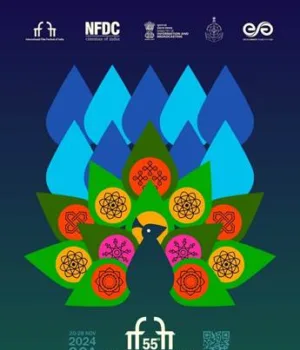The International Film Festival of India (IFFI) stands as a beacon of cinematic excellence, showcasing a harmonious blend of regional and global films that reflect a variety of cultures, narratives, and artistic pursuits. IFFI has been an example of how to attain global acclaim and prowess without parting with the local roots. It has become a melting pot where films, artists and visitors from all over the world come together to celebrate the art and craft. It is also a joyous celebration of the power of cinema as a universal language that transcends boundaries and brings together filmmakers and audiences worldwide.
It is fascinating how the entire structure of IFFI allows it to become a bridge that connects the local with the global. IFFI takes place in the city of Goa, known for its deep-rooted Portuguese heritage, with beautifully preserved 17th-century churches and the surrounding tropical spice plantations. The multi-cultural fabric of Goa’s society shines brightly advocating equal respect for all cultures.
The statistics reflect that IFFI positions itself as a platform where diversity is cherished. This year’s 55th IFFI festival, to be held from November 20 to 28 in Goa, has attracted significant global participation, with 1,676 submissions from 101 countries and more than 180 films from 81 nations set to be presented. Such numbers highlight IFFI’s expanding global footprint and its role as a conduit between different cinematic traditions. At the same time there are multiple vernacular language movies that rule the screens providing a culture-fluid ecosystem for art to thrive!
One of the key aspects that underscores IFFI’s unique position as the champion of regional cinema is the Indian Panorama section. The diversity is reflected in the multiple vernacular language movies that are selected. This year’s selection includes 25 feature films in total out of which five are Hindi films, two Kannada films, one Tamil film, 3 Marathi films, two Telugu films, one Gujarati film, three Assamese, four Malayalam, three Bengali and one Galo film.
Similarly in the Non-Feature category there are 20 selections including seven Hindi films, 2 Tamil films, one Bengali film, one Haryanvi film, one Garo film, one Punjabi film, one Ladakhi film, one Marathi film, one Oriya film, one Tamil, one English, one Rajasthani film and one Konkani film. This selection is a testament to the myriad storytelling traditions present within India, offering a microcosm of its diverse culture.
Co-Production Market further reinforces this blend of local and international as it showcases the seamless integration of local and global film industries. The official selection for the Co-Production Market featuring 21 feature films and 8 web series from seven countries. including Hindi, English, Assamese, Tamil, Marwari, Bengali, Malayalam, Punjabi, Nepali, Marathi, Pahadi, and Cantonese.This selection exemplifies IFFI’s dedication to fostering a collaborative and culturally inclusive cinematic environment, blending regional and global storytelling.
Similarly, the Film Bazaar’s Work-in-Progress (WIP) Lab at IFFI 2024 exemplifies the festival’s commitment to nurturing new voices in cinema. The selected films include Shape of Momos by Tribeny Rai (Nepali), Gaangshalik (Gaangshalik – River Bird) by Shakteedhar Bir (Bengali), Yerra Mandaram (The Red Hibiscus) by Mohan Kumar Valasala (Telugu), Kaatti Ri Raatti (Hunters Moon) by Ridham Janve (Gaddi, Nepali), Umal by Siddharth Badi (Marathi), and The Good, The Bad, The Hungry by Vivek Kumar (Hindi). Notably, five of these films are debut features, highlighting the immense potential and innovative vision of young filmmakers. The Lab’s hybrid model of online and offline mentoring facilitates vital feedback, enabling these filmmakers to refine their projects with both regional authenticity and global appeal.
Additionally, IFFI 2024 honors Australia as the “Country of Focus,” a move that enhances the festival’s international character and underscores shared storytelling traditions through the India-Australia Audio Visual Co-production Treaty. This emphasis on cross-cultural dialogue exemplifies how IFFI goes beyond being just a festival—it is a meeting ground for global narratives, where diverse voices come together to celebrate cinema.
With such extensive global and regional participation, IFFI 2024 is poised to be a beacon of artistic exchange, reflecting how cinema can act as a conduit for connection across borders. By championing both emerging and seasoned filmmakers and facilitating a blend of local authenticity and international collaboration, IFFI solidifies its role as a vital cultural hub that celebrates the vivid stories of the world.






